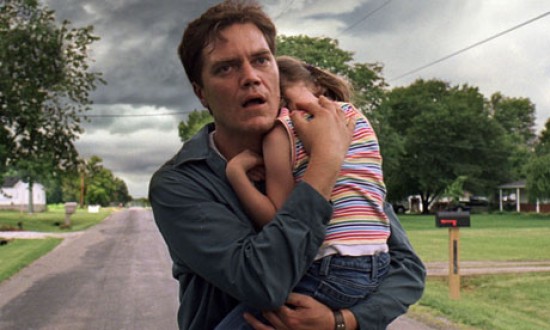Adam is clairvoyant. He has a sense about people. Aware of mood and feeling imperceptible to most, Adam seems to be an emissary of empathy. Having worked with mentally challenged—especially autistic individuals—he is a translator, one who understands both worlds: ours and theirs. Deep sensitivity in combination with altruistic motives, communicated with careful words, is a gift. American culture generally has been slow in recognizing human differences. Real emotions are sidestepped or their depth unappreciated. The movie Take Shelter is an appreciation of unseen conditions, their connections made possible by one person. Michael Shannon’s exceptional performance offers a window into the soul of a man whose personal life may well have benefited others if only those without his gift world have listened to his interpretation. Take Shelter is itself difficult to interpret, eliciting responses to themes of human personhood and superhuman reality. Those who have grown up around others battling mental illness all too well appreciate psychological-emotional suffering. The viewer obtains a glimpse into the difficulties of depression, schizophrenia, diagnosis difficulties, drugs, and institutionalization. But most importantly Shannon’s character Curtis is misunderstood, and so, marginalized. Curtis’ secretive reaction to his condition is understandable. [Heritability—wondering if one’s life would somehow be made null and void by such an affliction—is a real fear.] Those closest to Curtis give their best effort to give him space. But Curtis’ personal sense of apocalypse creates havoc for all around. Little by little Curtis loses hold to physical and emotional reality. Each film sequence expertly builds on the next; each actor enters their scenes playing roles it seems they were born to. Jessica Chastain deserves special mention. Samantha (Chastain), Curtis’s wife, shows true compassion in the midst of growing apprehension, while maintaining love’s commitment. The whole of the movie is outstanding and beyond simple reportage. Exceptional writing draws taut drama. Reality defies labeling and life is full of complexity, realized through the skilled storyline written by Jeff Nichols. 20 years has passed since penning his sensational School Ties, speaking on behalf of ethnic differences. Dismissing the differences of another person, even those with a diagnosed mental illness may cost a great deal in the end, including Take Shelter’s final scene which the viewer will not soon forget. Are Curtis’ visions pointing to something real? Or is he beginning to battle schizophrenia like his mother before him? Could both can be true? Others, different from ourselves, have insights to share with the rest of the world, insights which our world would be wise to consider. All people have something unique and valuable to contribute. Remnants of glory, broken shards of a mirror, still fulfill their duty, offering reflection in the dark where others need light. Human brokenness is indicative of the human condition. Each person dispenses a knowledge others need. So humanity is in need of interpreters; special interlockers, who can see what the rest of us cannot see, interpret with other eyes. We need the Adam’s and Curtis’s of this world. Rated R for some language, violence, disturbing images, and emotional complexity Anna Drehmer, my movie-watching friend who is finishing her masters at Covenant in St. Louis, is co-writer in this review. Anna’s personal insights are deep. I will never forget the night she came to our home trying to convince me A Muppet’s Christmas Carol was a good movie. It is the only time we have disagreed about film. Thank you Anna!

